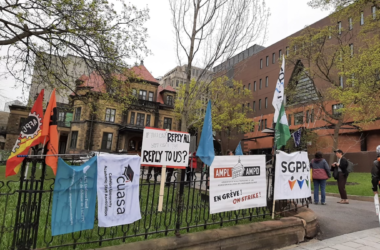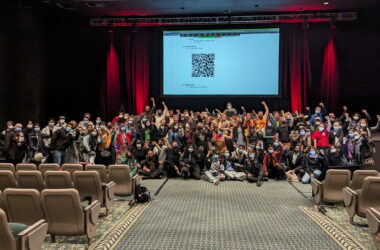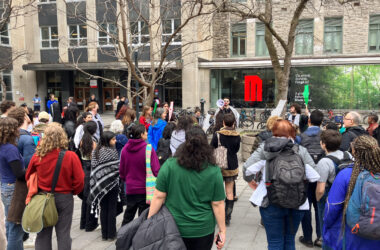This past month, Divest McGill has protested outside of the Arts Building every Friday as part of its new ‘Fossil-free Friday’ initiative. The target of their demonstrations is McGill’s ongoing investments in fossil fuel companies.
“Bringing [Fossil-Free Fridays] back up again is a strategy [that will] engage the community and have a lot of visibility, especially with what is happening worldwide right now,” Divest McGill member Morgen Bertheussen said.
The weekly protests are inspired by Swedish teenage activist Greta Thunberg’s strikes for climate action. Thunberg skips school every Friday to perform sit-ins at the Swedish parliament, a demonstration which has garnered significant international attention. Divest McGill has previously participated in Fossil-Free Fridays through social media campaigns, although they eventually abandoned this strategy and turned their attention was turned toward addressing McGill’s administration more directly.
According to Bertheussen, the club’s latest protests are an act of solidarity with a global movement of university students protesting their school and nation’s climate change policies. 35,000 students from Belgium held walk-outs and rallies over the past month, and Vermont’s Middlebury College has recently joined the schools divesting from fossil fuels.
Divest McGill hopes to influence the Committee to Advise on Matters of Social Responsibility (CAMSR), which is responsible for advising McGill on its investments.
“[We want] to put pressure on the university so that they divest their endowment fund from the fossil fuel industry,” Divest McGill member Marie-Claude Carignan said. “We’ve been working on that for six years now by putting pressure on the CAMSR committee of the Board of Governors.”
CAMSR, which reports to the McGill Board of Governors (BoG), is currently considering a proposal for divestment for the third time in six years. According to Bertheussen, two previous requests were rejected for non-scientific reasons.
“[CAMSR] stated that fossil fuel companies do not create grave social injury,” Bertheussen said. “CAMSR has until the end of 2019 before they [need to] publish their report in response to the calls for divestment. Until then, it is the aim of Fossil-free Fridays to keep the topic fresh in the minds of the student body.”
Bertheussen argues that funds should instead be redirected toward more sustainable investments.
“The main goal of the organization is to put pressure on CAMSR to redirect their investments into companies that are known to be socially and environmentally responsible,” Bertheussen said.
Fossil-Free Friday protests have drawn small groups of protesters with handmade signs, eager to speak to anyone who passes by. The protesters believe strongly in the seriousness of their cause.
“[Climate change] is the moral crisis of our time,” Divest McGill member James Flanagan said. “It’s kind of hard to comprehend the scale. I think that’s why society has been so slow [to understand] how gravely wrong our society has been in destroying life on Earth.”
Divest McGill’s weekly protests are a prelude to a worldwide walkout for climate change taking place on Mar. 15. Students at McGill University are planning a contingent to join the wider Montreal protest, alongside other universities including Concordia and Université de Montréal.
“McGill divesting as an institution is not an end-all solution to the whole climate crisis,” Bertheussen said. “However, this action of divesting is a moral stance that has political implications. If large institutions […] start taking a stance on divestment, [it] will send a message to the governments.”
Divest McGill’s Fossil-Free Fridays will take place every Friday this semester from 11:15 a.m. to 1:15 p.m. outside of the Arts Building.









